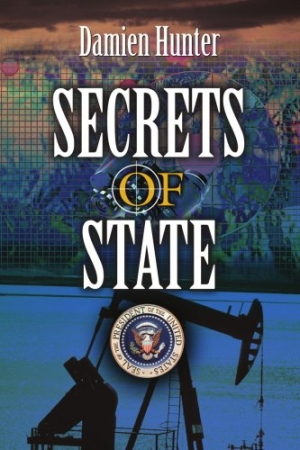Secrets of State
Who uses a tactical nuke to take out a single secret agent? Not even a Bond villain has ever become so frustrated in the hunt for his elusive target as to resort to atomic weapons, but such is not the case in Damien Hunter’s amusing—if at times convoluted—thriller, Secrets of State.
Most of Hunter’s book is far less outrageous than the nuclear event of Chapter 27 (an occurrence so unlikely that the author has another character explain how such a thing could never happen). His story of a secret agent on the run is a classic tale of an operative used, betrayed, and then deemed too dangerous to be allowed to live lest he expose the wrongdoings of his boss. When Hunter sticks to that plot, his writing sings and thrills, and readers will hurry through the paragraphs to find out what happens next.
Unfortunately, Hunter has a habit of going off on tangents, inserting unnecessary subplots and introducing extraneous characters that only serve to clutter up and confuse what is otherwise a fine story. These sidebars and little excursions could be cut out or at the very least minimized; doing so would not only tighten the story line but also allow the reader to appreciate the fine craftsmanship of the central theme.
That theme is a familiar one to readers of the genre or to anyone familiar with stories of spies or assassins. Hunter throws all the right switches as he powers up the plot machine, even plugging into the story the infighting that goes on among various branches of the US intelligence and law enforcement services, none of which seem to know what the other is doing. There is the usual mix of good agents and bad bureaucrats, inept bumblers and greedy bastards, honorable soldiers and dirty double-dealers and, of course, devastatingly beautiful women. And for good measure, Hunter throws in a heroic priest, a couple of tough nuns, and one charming old codger who is meant to be something of a warm and fuzzy aggregate of “Wild Bill” Donovan and William Casey, near-legendary figures of American intelligence.
Hunter sometimes buries the reader in an alphabet soup of government agency initials (and not just those of the United States government) and weakens his villain’s villainy by making him not only part of but also a tool of a vast international conspiracy. Most readers will almost immediately realize that Julius Barnaby is the bad guy, but he is a more compelling bad guy when it seems he is acting on his own for his personal aggrandizement.
Secrets of State is very good when its author stays on course, and had Hunter maintained his focus this could easily have been a lean and tense five-star thriller. That book is still here, and if it were stripped of about ninety pages, it would be a breathless sprint to a gold-medal finish—one that might even make it to the silver screen.
Reviewed by
Mark McLaughlin
Disclosure: This article is not an endorsement, but a review. The publisher of this book provided free copies of the book and paid a small fee to have their book reviewed by a professional reviewer. Foreword Reviews and Clarion Reviews make no guarantee that the publisher will receive a positive review. Foreword Magazine, Inc. is disclosing this in accordance with the Federal Trade Commission’s 16 CFR, Part 255.

